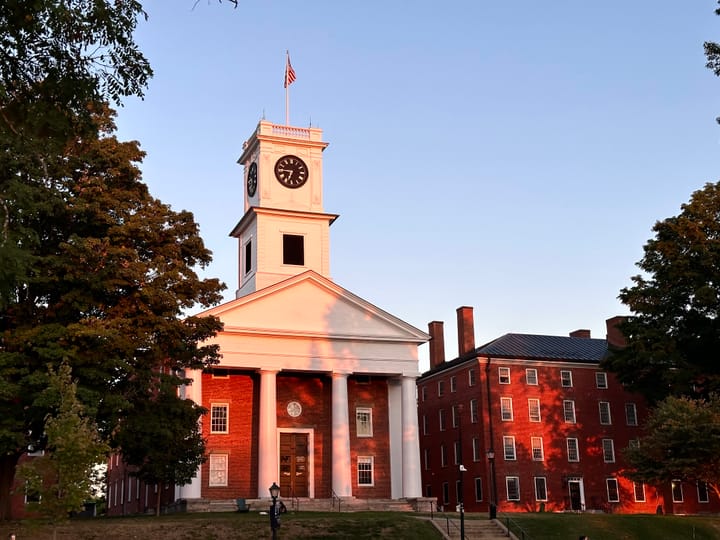Students Plan Off-Campus Travel Over Fall Break
Off-campus travel will not be restricted during Fall Break (Oct. 9-12), although the college strongly encourages students to stay on campus. Students expressed excitement over the opportunity for a change in routine and scenery, as well as gratitude for the college’s return testing protocol.
The college announced that it will not restrict off-campus travel during Fall Break (Oct. 9-12), but that it “strongly encourages students to stay on campus,” in an email sent by Dean of Students Liz Agosto on Sept. 11. The college’s decision regarding fall break travel has been up in the air since Aug. 24, when President Biddy Martin wrote that it was “possible” that travel would be restricted. The determination came alongside news about the loosening of other protocols, most notably the reopening of indoor dining on campus.
The college is primarily concerned with the broadening of sources from which students could contract Covid-19. Director of New Student Programs Marie Lalor told The Student that the college partially attributes this semester’s “very small number of Covid-19 cases” to the off-campus travel boundary of Hampshire County. “Fall Break presents the first opportunity where students may travel well beyond the county, including to hot spots where the variant continues to infect significant numbers of people,” Lalor said. Despite these concerns, the college is allowing students to travel beyond the county in an effort to provide a “more ‘normal’ campus experience,” coupled with safety measures such as a travel form and mandatory testing upon returning to campus.
Students’ plans for the break vary. Many students, particularly upperclassmen, plan to leave campus and either return home or travel elsewhere for vacation with friends. “I very much feel the urge to branch out, see something other than just the town,” Emma Daitz ’23 said.
Multiple students cited their desire for a “real break” that offers a change of scenery and routine. “Even though now it's not a literal bubble, … college is still sort of metaphorically a bubble…,” said one student who preferred to remain anonymous, “and so it's always nice to have a chance to do something different and remember that we're part of a bigger world.”
Jeanyna Garcia ’23 referred to her experience in the campus bubble last year as a reason that she is eager to leave the campus for the break. “I was living, breathing, sleeping Amherst 24/7 … I felt the bubble very close,” she said, “I don't want to repeat those same scenarios.”
Other students will remain on campus. Quincy Smith ’25 said that he sees “no point” in traveling home due to the short length of the break.
Garcia explained that she did not travel home during her first year because it was expensive and required too much planning; she sees this as a common barrier for other students traveling home as well. Even students who live close to the college — and could travel home — lack the necessary funds or the bandwidth to deal with logistical factors.
The same limitations are also barriers to enjoying an on-campus Fall Break as well; Garcia cited the fact that she doesn’t have access to a car on-campus, and therefore has less mobility when at school. This is another reason that she wants to travel home to New York City, a place where she can “regain [her] independence” through public transport.
The college is attempting to schedule school-sponsored activities to keep students occupied and ultimately compel them to stay on campus. Lalor said that the Student Activities office has planned a full schedule of activities for students that remain on campus during Fall Break, including trips to Mt. Sugarloaf, Park Hill Orchard and Flayvors of Cook Farm.
When asked about the college’s expectations in terms of student response to the guidance, Lalor expressed that the college wants “to stress for students the importance of thinking through how their behaviors off campus might affect the health of our entire community.”
Several students are not basing their travel decisions solely on the college’s guidance. “If people are planning on going, they’re gonna go,” Daitz said.

However, there are those that are factoring Covid-19 into their decisions. Some students are traveling to nearby locations instead of their home states or to other Covid hotspots. Daitz, for example, said that she “would’ve considered going somewhere like Florida for fun,” but that she will instead most likely travel somewhere close by. Others mentioned changing their travel plans to exclude flying. “I think there is more of a Covid risk … where I'm from, and also just in the process of traveling there [by plane],” said the same anonymous student, “whereas here I'm still kind of staying in the general region and I'm definitely planning on being very careful.”
Students also expressed gratitude for the return testing protocol, saying that it makes them feel safer because they do not know where classmates might end up over the break. “I'm kind of scared. If people are going over there and coming back,” Smith expressed, “I think [the college’s approach] makes sense.”
The college’s fall break policy encompasses its attempt to find a middle ground between opening things up and mitigating risk. “Striking that balance is not easy or simple,” Lalor said.





Comments ()